Bidens, a common weed of pastures and vacant lots, has antiviral and antibacterial superpowers. Get to know it better. You never know when you might need to call on it as your herbal ally.
Invasive plants are God’s way of making sure we notice his medicines.
Bidens, an overlooked weed that will help you in the fight against MRSA infections
If you spend any time walking through pastures or vacant lots in July and August, you may have met Bidens. And if you haven’t met it, your dog probably has. Bidens sticks like a needle into your clothing. If your dog walks through a patch of Bidens, you’ll be picking the needle-like seeds out of his coat for hours. Also called, “beggarticks”, “Spanish needles,” “demon spike grass,” and “needle grass,” 1000 Biden seeds weigh less than a gram. If you walk through a patch of Bidens in the fall, and you’ll probably have 1000 seeds in your socks. Hint, wear jeans not your yoga pants when you go looking for it.

Most people hate getting tangled in Bidens, but when I tell how amazing it is, you’ll be tending your patch with love – and harvesting it before it sets seed. And that’s a win-win! In fact, this weed could save your life.
Bidens is prolific and one of the first plants to colonize disturbed ground. It is originally from South America and was spread by the Spanish during colonization. It is now widespread all over the world, growing at every elevation, and in most eco-ranges on the planet. Bidens will even grow in the desert. You probably have some growing near you, but if you don’t, you soon will.
The plant actively colonizes disturbed land. Like alfalfa, it gives off a toxin that inhibits the growth of competing plants, and therefore reduces domestic crop yields. But it is not toxic to grazing animals.
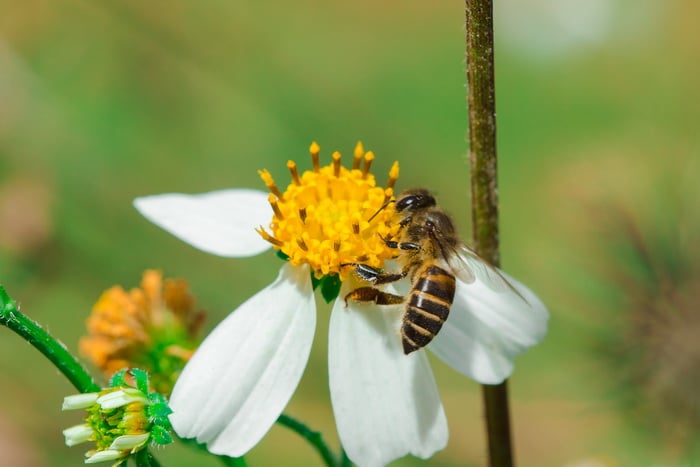
Bidens pilosa
The Best Kept Secret
In 1929, Alexander Fleming discovered Penicillin. It began to be readily available with WWII. At that time new antibiotics were being discovered daily. However, Dr. Fleming noted as early as 1929 that numerous bacteria were already resistant to Penicillin. At that time 14 percent of staph bacteria were resistant to penicillin. By 1995, with decades of widespread use of antibiotics, 95% of staph were resistant to penicillin. In 1960, when resistant staph had become the most common hospital-acquired infection, physicians started using methicillin to combat resistant strains. In just a year, MRSA (methicillin-resistant staph) emerged. 70 years from the introduction to antibiotics, some staph bacteria have become resistant to all known pharmaceutical antibiotics. Bacteria seem to be winning the “war on disease.”
Herbs are different than pharmaceuticals. Bacteria can develop immunity to pharmaceuticals because they represent only one, or a few, compounds. Natural herbs, on the other hand, are made up of hundreds of complex compounds that bacteria can’t develop immunity to. Bidens is a natural antibiotic that will successfully treat antibiotic-resistant bacteria. It outperforms penicillin, tetracycline, methicillin, and other antibiotics for both gram-positive and gram-negative bacteria.
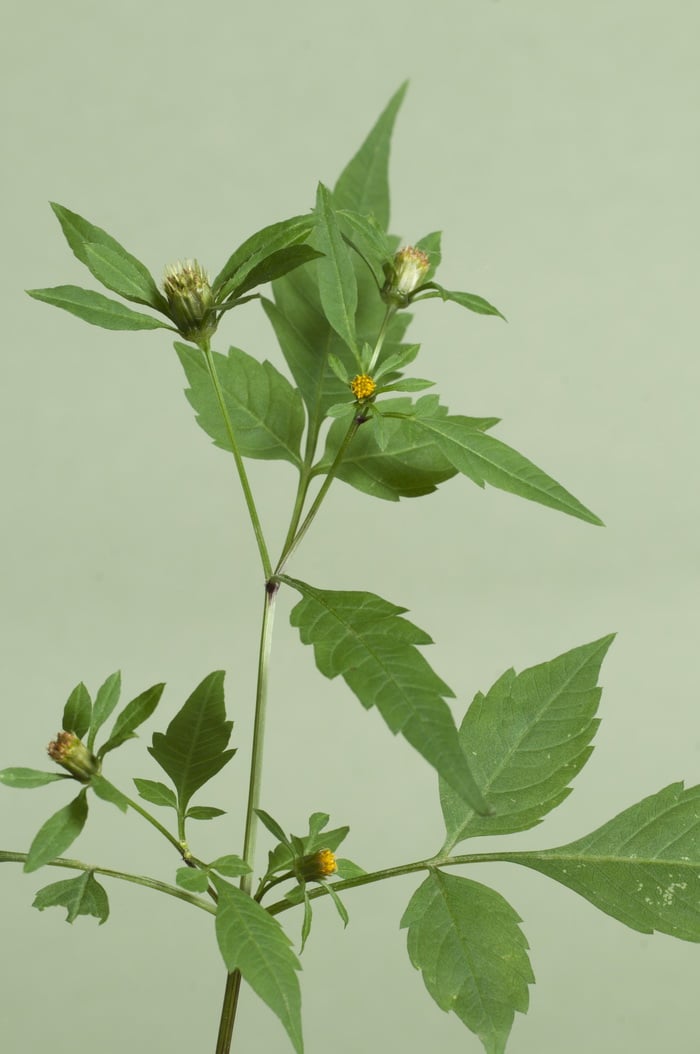
Bidens tripartita
How to Grow Bidens
Bidens is an annual. It grows easily from seed. If you do decide to plant it, be sure that it isn’t considered noxious in your area, first. Plant the seed 4 cm deep in moist soil in early spring. You can broadcast it or sow it in rows. Keep the soil moist until it emerges. Bidens lacy leaves are attractive and it is used as a potherb in much of the world. If you are using it for food, harvest the leaves when they are young, and use it as a spring tonic food. The plant gets more astringent as it ages, but don’t make it a major part of your diet. The high silica content can lead to problems.
If you are growing it medicinally, remove the flowers as they appear to extend the harvest window, retard seed maturation, and encourage leaf production. You will be able to get several harvests of leaves before Fall, depending on your climate. Older leaves are more astringent and drying than young leaves. In my tincture, I used a combination of both older and young leaves.
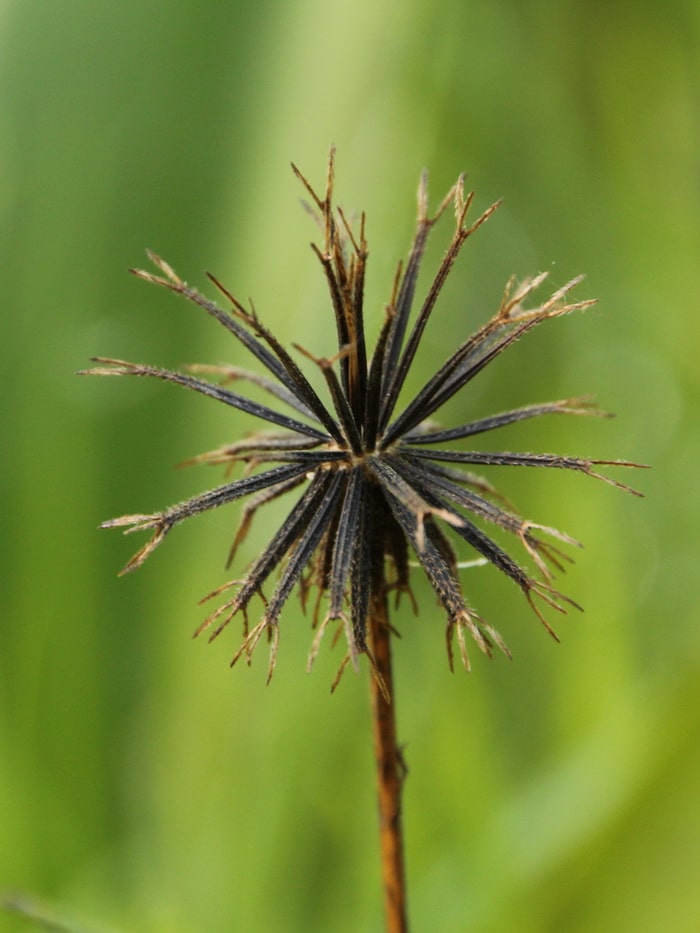
Seed head of B. pilosa
Bidens pilosa, also called Bidens leucantha, is the main species used for medicinal studies, but there are a number of other varieties in the Bidens genus that historical use and early studies suggest can also be used. The entire plant is medicinally active, including the roots. A lot of scientific studies have been done on the constituents of Bidens pilosa, identifying around 100 different plant chemicals so far. The most promising are the flavonoids, and the poly-acetylene compounds, having the broadest anti-microbial activity.
Herbalist Michael Moore was the first modern herbalist to recommend Bidens as a mucus membrane tonic. It not only removes the pain but also heals the tissue.
“Bidens may be our best herb for benign prostrate hypertrophy, usually decreasing the membrane irritability both in the urinary tract and the rectum, and often, over a few weeks of use, noticeably shrinking the prostate and giving its connective tissue better tone.” (Michael Moore, Medicinal Plants of the Pacific West, p.71.)
Bidens increases the efficiency of the kidneys to excrete uric acid from the blood, decreasing the likelihood of a gout attack. It also acts as a tonic and preventive in gastritis and ulcers, diarrhea and ulcerative colitis.
“Because it is a mucus membrane tonic and is astringent, powerfully anti-inflammatory, and strongly antibacterial, it is specific for a number of diseases caused by resistant pathogens: UTIs, chronic diarrhea and dysentery, gastritis and ulcers (anywhere in the GI tract, from mouth to anus), inflamed mucous membranes in colds and flu and respiratory infections of any sort, sore throats from coughs or infection or even overuse of the throat, and vaginal infections.” (Stephen Harrod Buhner, Herbal Antibiotics, Natural Alternatives for treating drug-resistant bacteria, p.137)
Bidens actions:
- Antibacterial
- Antidiabetic
- Antidysenteric
- Anti-inflammatory
- Antimalarial
- Antimicrobial
- Antiseptic
- Astringent
- Blood tonic
- Carminative
- Diuretic
- Galactagogue
- Hepatoprotective
- Hypoglycemic
- Hypotensive
- Immunomodulant
- Mucous Membrane tonic
- Neuroprotectant
- Prostaglandin synthesis inhibitor
- Styptic
- Vulnerary
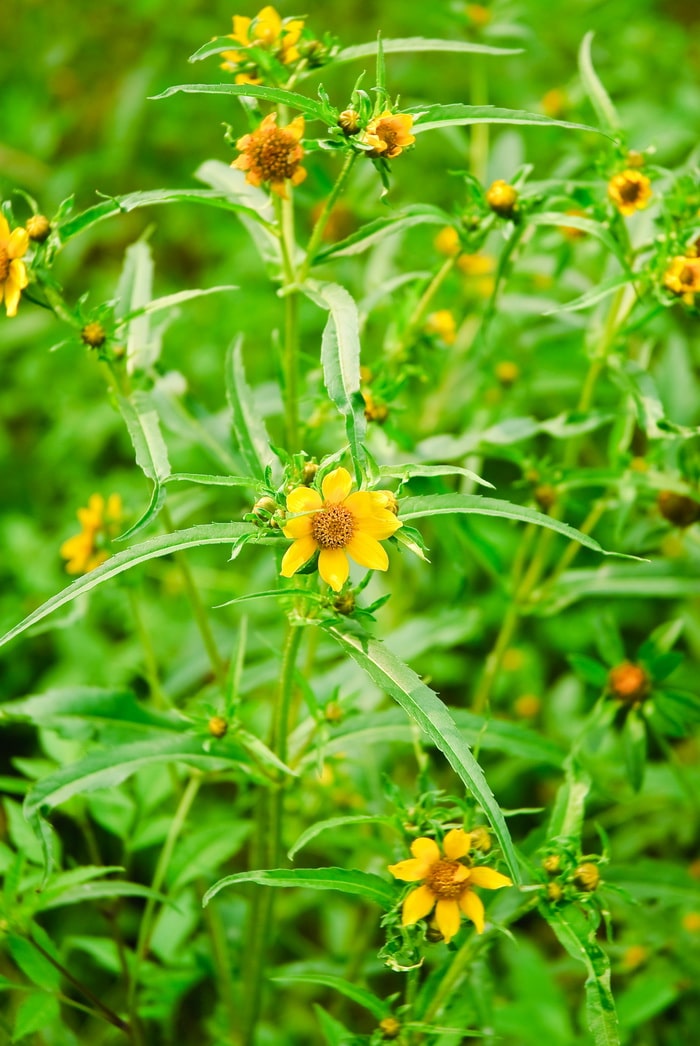
Bidens tripartita
Bidens is active against:
- Bacillus cereus
- Bacillus subtilis
- Candida albicans
- Human cytomegalovirus
- Entamoeba histolytica
- Enterococcus faecalis (Streptococcus faecalis)
- Escherichia coli
- Herpes simplex 1 and 2
- Kiebsiella pneumonia
- Leishmania amazonensis
- Mycobacterium tuberculosis
- Neisseria gonorhoeae
- Plasmodium spp.
- Pseudomonas aeruginosa
- Salmonella spp.
- Serratia marcescens
- Shigella Flexneri
- Staphylococcus aureus
- Staphylococcus epidermidis
Bidens is not very active against Aspergillus, a fungus that affects people with a weakened immune system.
When to Harvest Bidens:
While Michael Moore suggests harvesting the leaves during the growing season and drying the plant for tea, the antimicrobial actions of the plant are strongest when the fresh leaves are juiced or the fresh leaves are macerated in alcohol to make a tincture. Many of the active ingredients in the plant are soluble in alcohol but not in water.
For use as an antimicrobial, harvest the leaves fresh and make a tincture. Black pepper is synergistic and enhances the actions of Bidens. Use 5% freshly ground black pepper in your tincture for maximum synergy. However, black pepper should not be used if the tincture will be used in the treatment of severe GI illness. See the caution below.
Cautions:
Bidens possesses anti-diabetic properties. It lowers glucose levels, increases insulin sensitivity, and stimulates the release of insulin from the pancreas. It should be used with caution in people with insulin-dependent diabetes. Definitely speak to your doctor before using Bidens for its glucose-lowering properties if you are on insulin.
If you are using this tincture for severe intestinal infections such as E. coli or cholera, omit the pepper in the tincture. The pepper can increase intestinal permeability, which can allow the resistant organism access to your organs in greater numbers, making you much sicker.
Bidens in the treatment of Malaria
Alcohol tinctures of the fresh plant showed a 90% inhibition of the malarial parasite in vivo, while the dried plant tinctures showed a 65% inhibition rate and the water extracts only a 38% inhibition rate. This was the same whether resistant or non-resistant strains were used. In comparison, chloroquine-susceptible strains, when treated with chloroquine, will show a 99% inhibition. So Bidens is almost as effective as the drug on chloroquine-susceptible stains, but not quite.
On the other hand, when the parasite becomes resistant, Bidens continues to work. So when using Bidens for malaria, larger doses need to be taken for longer periods and only use the fresh leaf tincture.
Bidens effect on blood pressure and heart rate
Bidens has a relaxing effect on the vascular tissue, is a vasodilator, and relaxes the heart. It reduces the aorta resting tone and inhibits the KCL and CaCl2 induced contractions by 95%. The effects are long-lasting. It lowers blood pressure.
Pepper is synergistic to the actions of Bidens. Ginger is also a catalyst to the actions of Bidens, increasing circulation and moving the plant compounds throughout the body. The following tincture recipe contains both to help increase the effectiveness of Bidens in treating antibiotic-resistant disease.
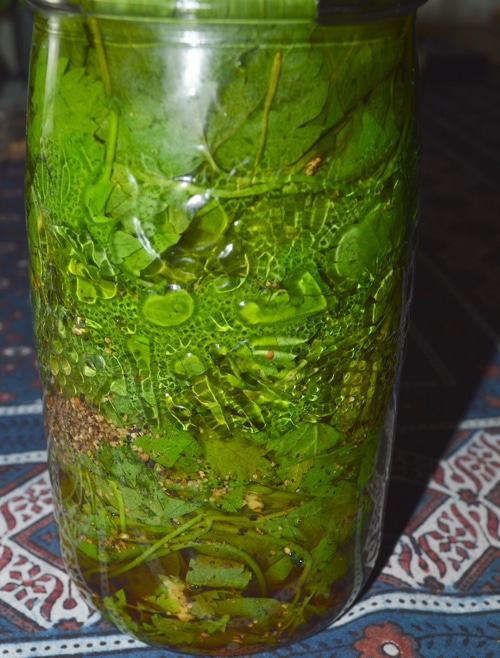
Making a Broad-spectrum Antimicrobial Tincture with Bidens
Bidens should be tinctured using fresh leaves. The whole plant is active so you can use the seeds, leaves, stem, and roots if you like. It’s still early in the season and I am hoping to get another harvest of leaves before Fall, so I only took the leaves, flowers, and immature seeds in my harvest today.
Ingredients:
- 4 cups of freshly picked bidens leaves, compressed
- 6 tbsp. of pepper, freshly ground (omit if the person has diarrhea) Note that dried herbs and spices lose their effectiveness over time, so if your pepper is old, buy fresh whole pepper berries for this recipe.
- 1-inch piece of fresh ginger, peeled and coarsely grated
- 100 proof Vodka to fill a quart jar
Directions:
- Place fresh Bidens leaves, pepper, and ginger in a wide mouth quart jar.
- Fill with vodka or whiskey with the highest alcohol content you can find. In BC we are limited to 40% alcohol and this is sufficient. But if you can buy vodka or whiskey with a higher alcohol content you can use that.
- Macerate for 6 to 8 weeks, shaking the jar as often as you think of it. Strain.
- Bottle in colored glass bottles and cap tightly. Store in a cool dry place. The tincture should last several years.
Dose: 45 to 90 drops in water up to 4 x daily.
Notes:
Bidens is used to remediate toxic waste dumps and will absorb cadmium and arsenic. Don’t harvest leaves where they may have been exposed to toxic waste.
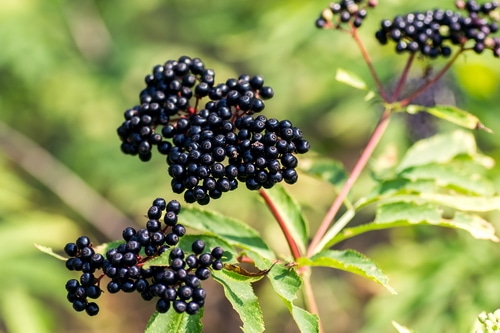
Check out other plants with strong anti-microbial actions:
Isatis tinctoria (Dryer’s Woad) as a natural antibiotic
Woad is also antiviral. See my guest post on The Herbal Academy
Calendula is also a mild antiviral It’s also antifungal and antimicrobial.
Elderberry stops viruses from replicating. It’s high in antioxidants as well as being antimicrobial.
Try these natural antibiotics for MRSA
Hint: Our best anti-microbials are also anti-oxidant, and anti-aging. Many are also anti-viral. How cool is that?
References:
Stephen Harrod Buhner. Herbal Antibiotics, natural alternatives for treating drug-resistant bacteria. Storey Publishing, 2012. pp. 127 – 140.
Michael Moore. Medicinal Plants of the Pacific West. Museum of New Mexico Press, 1993. pp.68-71.



Bipinatta are pretty good…
Bipannata has same healing properties.
Bidens posses anti-diabetic properties, lowers glucose levels, increases insulin sensitivity & stimulates the release of insulin from the pancreas. It should be used with caution in people with insulin-dependent diabetes. I copied this from the above article.
Would be willing to share some? I don’t have any where I live.
I have tons of Bidens Alba. Does this have any medicinal properties?